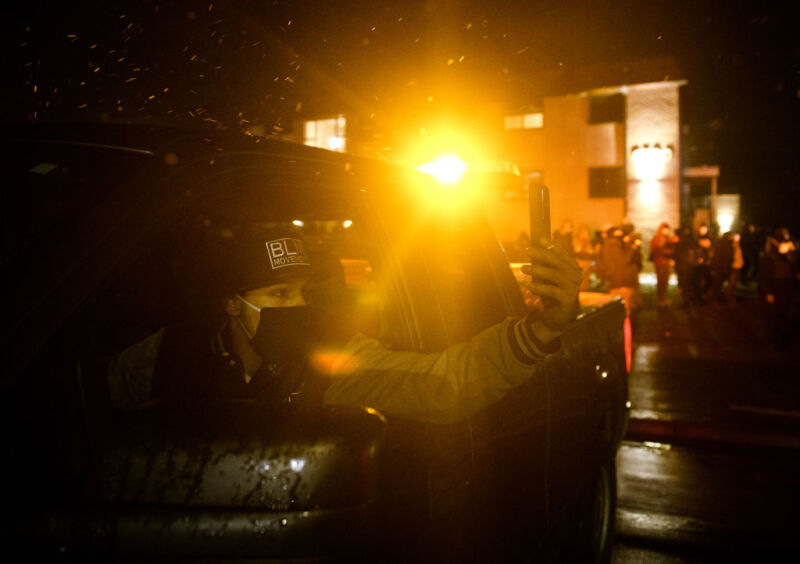
The same week that a federal judge sentenced ex-cop Derek Chauvin to increased prison terms for killing George Floyd, Arizona passed a law that would make it harder to call police by limiting how close bystanders can get while recording specific crimes. law enforcement activities. Chauvin was convicted in part because a recording showing his attack on Floyd up close went viral. It was filmed by a teenager named Darnella Frazier standing “a few feet away”.
Arizona’s new law requires bystanders recording police activity in the state to be at least 2 feet away from the action. If bystanders approach after police warned them to back off, they risk being charged with a felony and fines up to $500, jail time up to 30 days or probation for up to one year.
Sponsored by Republican State Representative John Kavanagh, the law known as HB 2319 makes it illegal to watch the police at close range. In a USA Today op-ed, Kavanagh said it’s important to leave this buffer for the police to protect law enforcement officers from assault by unruly bystanders. He said “there is no reason” to move closer and predicted tragic consequences for those who do, saying: “Such an approach is unreasonable, unnecessary and unsafe and should be made illegal.”
This week, with few exceptions, Kavanagh succeeded in making close-range shooting illegal in Arizona. Perhaps most critically, the person involved in the police activity – someone who is being questioned, arrested or treated by the police – can record, as long as it does not interfere with police action. The same exception applies to anyone who picks up a vehicle during a police check.
In addition, anyone who records activity from a closed-off structure on private property still has the right to include the police within a 2-meter radius, unless law enforcement “determines that the person is interfering” or “it is not safe” for them to be in the area. That caveat may give the police a lot of discretion about who can record and when.
Kavanagh said he decided to push for this change in Arizona’s law after some Tucson officers complained that bystanders sometimes stood a foot or two behind them while recording arrests. The state representative also told USA Today that his decision to set the minimum distance at 2 meters is “based on the fact that 2 meters has been established by the US Supreme Court as a reasonable distance, as they applied it to people entering abortion clinics.” and leave when confronted by protesters.”
Commenting on critics who believe that citizens should be able to get closer to law enforcement activities, Kavanagh said: “The argument that filming from 2 meters away does not allow a good view of the scene is ludicrous.” were recorded from further distances, including Rodney King (100 feet) and Freddie Gray (“clearly 8 to 10 feet away”).
Concerns About Constitutionality
In the past decade, similar attempts to restrict the registration of police activities have been repeatedly labeled as unconstitutional.
In 2011, a senior U.S. appeals court prevented police from arresting bystanders for allegedly “secretly” recording police activities, deeming police action a violation of both freedom of expression and a guaranteed protection against unreasonable searches and seizures. This provided “a constitutionally protected right to videotape the police”.
The following year, the U.S. Department of Justice stated in a letter that recording police activities should only be “subject to narrowly defined restrictions,” praising the practice because it improves public trust in law enforcement, aids public safety. and hold the police accountable. In 2017, a federal appeals court reaffirmed the First Amendment’s right to include police, saying that recordings both protect against abuse of power and exonerate wrongly accused agents.
Prior to the bill being passed, Kavanagh was concerned about the constitutionality of his bill, especially after attorneys for the state House of Representatives told him it could be unconstitutional to use the 8-foot buffer “at all.” police encounters”. To pass the law, Kavanagh amended the bill to “apply only to filming during police-citizen encounters where violence may be possible, such as arresting or subpoenaing people, questioning suspects, and dealing with emotionally disturbed people.”
Kavanagh has expressed confidence that the new law will withstand investigations into its constitutionality. However, earlier this year, Arizona’s ACLU tweeted that “this bill is not only a terrible idea, but also unconstitutional” because it “unnecessarily burdens people and gives the police too much discretion.”
Today, the Arizona ACLU renewed those concerns, with staff attorney KM Bell saying the law is a “horrifying” use of “the public’s most effective tool against police misconduct in violation of our First Amendment rights.”
“By limiting our ability to record police interactions, this law will undoubtedly make it even more difficult to hold police officers accountable for misconduct,” Bell said in an emailed statement.
Kavanagh did not immediately respond to a request for comment on constitutional concerns now that the bill has been passed.
For now, bystanders capturing Arizona’s police activity (as defined in the bill) must rely on their camera’s zoom capabilities if they want to follow in Frazier’s footsteps and capture close-up footage that police are responsible for. Her close range video has been deemed “one of the most important civil rights documents in a generation” by journalists and documentary makers.

